WHAT’S ON
WHAT’S ON

TABLE FOR ONE
by Vincen Beeckam
Exhibition Opening Party
Thursday 20 Nov - 7.00 - 8.30pm
Opening Times: Thu-Sat (12pm to 5pm)
FREE BOOKING
Artist Talk
Thursday 20 Nov - 6 - 7pm
BOOK TICKETS
In 2011, Vincen Beeckman was invited to create a project in the town of Dudelange, Luxembourg. On his first day, he stopped for lunch at Hang Chow, a local Chinese restaurant named after Hangzhou district. During his meal, Beeckman had an idea: he would eat lunch and dinner at Hang Chow every day for a week, letting the waiters choose his dishes. At the same time he would collaborate with staff, making pictures and gathering family photos, postcards and ephemera. What began as an experiment unfolded into a multi-chapter project, involving restaurants from Iran to Brazil and Rwanda.
Each restaurant tells a layered story of place, migration and belonging, with menus that speak to home provinces in China, as well as global events that have led to waves of emigration. While restaurants trade on authenticity, they are engaged in a constant dance, reshaping dishes to meet local tastes, while still providing a sense of home comfort for the diaspora. These intricate stories of authenticity and adaptation, memory and reinvention, are central to the work.
In 2024, Beeckman spent a week in Bristol, eating lunch and dinner at Dragon’s Delicacy, St. Werburghs. The restaurant’s cavernous banquet hall serves as a meeting place for the city’s East Asian diaspora. High backed chairs and cut-glass chandeliers nod to the grandeur of Cantonese culture. Specialising in Dim Sum, the menu speaks to these roots, yet there are also signs of northern influence, with earthy spices, chillies and peppers appearing across many dishes.
The exhibition will draw upon Beeckman’s time in Bristol, alongside a wider selection from across the project.
Full Press Release
Each restaurant tells a layered story of place, migration and belonging, with menus that speak to home provinces in China, as well as global events that have led to waves of emigration. While restaurants trade on authenticity, they are engaged in a constant dance, reshaping dishes to meet local tastes, while still providing a sense of home comfort for the diaspora. These intricate stories of authenticity and adaptation, memory and reinvention, are central to the work.
In 2024, Beeckman spent a week in Bristol, eating lunch and dinner at Dragon’s Delicacy, St. Werburghs. The restaurant’s cavernous banquet hall serves as a meeting place for the city’s East Asian diaspora. High backed chairs and cut-glass chandeliers nod to the grandeur of Cantonese culture. Specialising in Dim Sum, the menu speaks to these roots, yet there are also signs of northern influence, with earthy spices, chillies and peppers appearing across many dishes.
The exhibition will draw upon Beeckman’s time in Bristol, alongside a wider selection from across the project.
Full Press Release
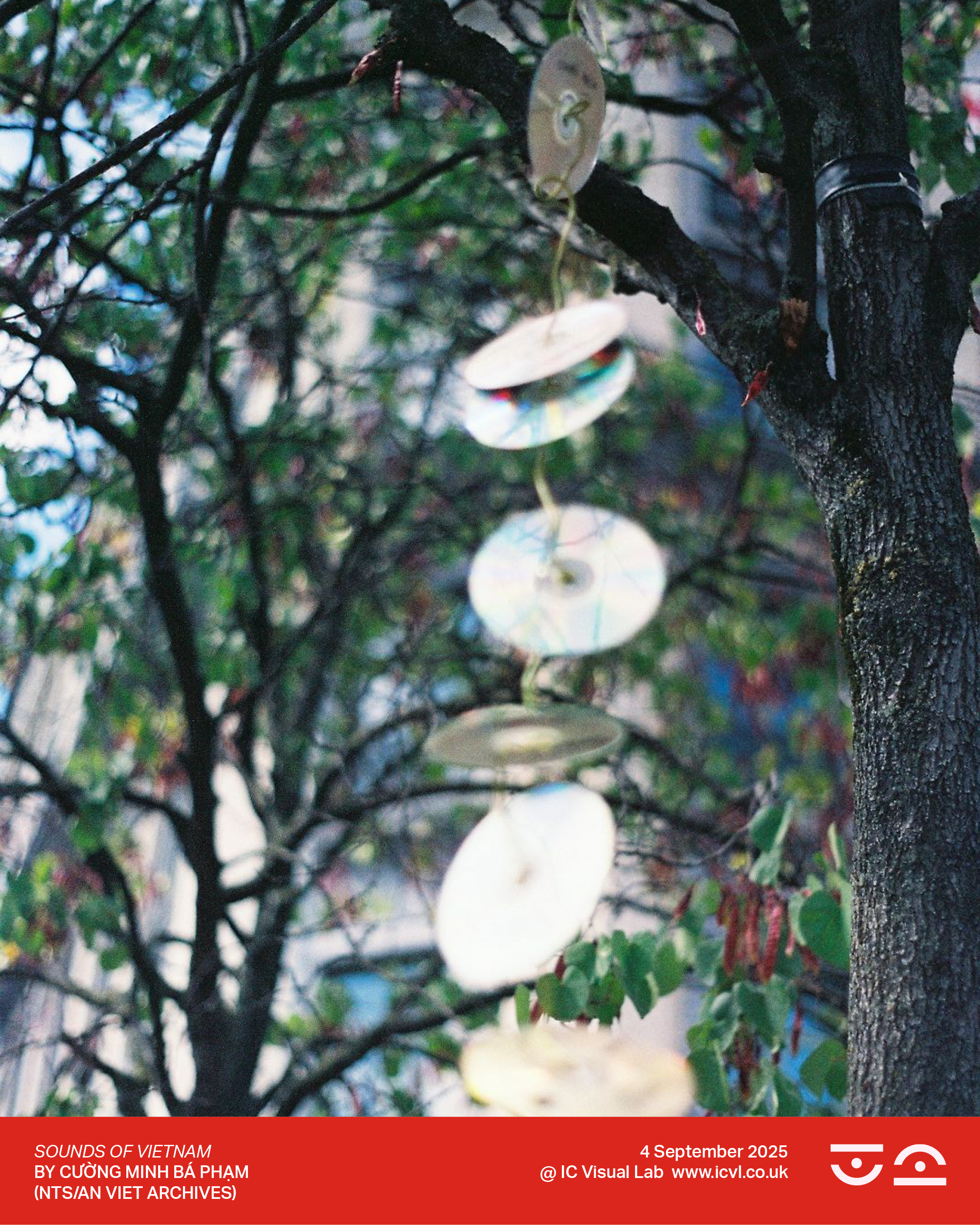
SOUNDS OF VIETNAM
Cường Minh Bá Phạm (NTS/An Viet Archives)
4 September, 2025 | 6-8pm
IC Visual Lab / 6 West St, Bristol, BS2 0BH
BOOK TICKETS
To celebrate the closing of our current exhibition - Mangrove Theatre by Võ An Khánh - we have invited Cường Minh Bá Phạm (aka Phambinho) to lead an audio journey through Vietnam's sonic landscapes.
Cường is a practitioner and researcher working at the intersection of sound, community and archives. He hosts a monthly NTS show under the handle ‘Phambinho,’ where he and occasional guests attempt to musically reframe ‘Asia’ as a contested paradigm. In addition, he has developed long-form projects for festivals and institutions across Europe and Asia. He is also the co-founder of An Việt Archives, which oversees the largest known collection of documents, photos, and other objects related to the British-Vietnamese experience, currently housed at Hackney Archives. Cường is in the first year of a UKRI-funded PhD at the University of Birmingham, as part of the larger SoundDecisions project. His research explores sound archives as sites of co-creation, co-discovery, and interaction for diasporic groups who imagine the Mekong Delta as home.
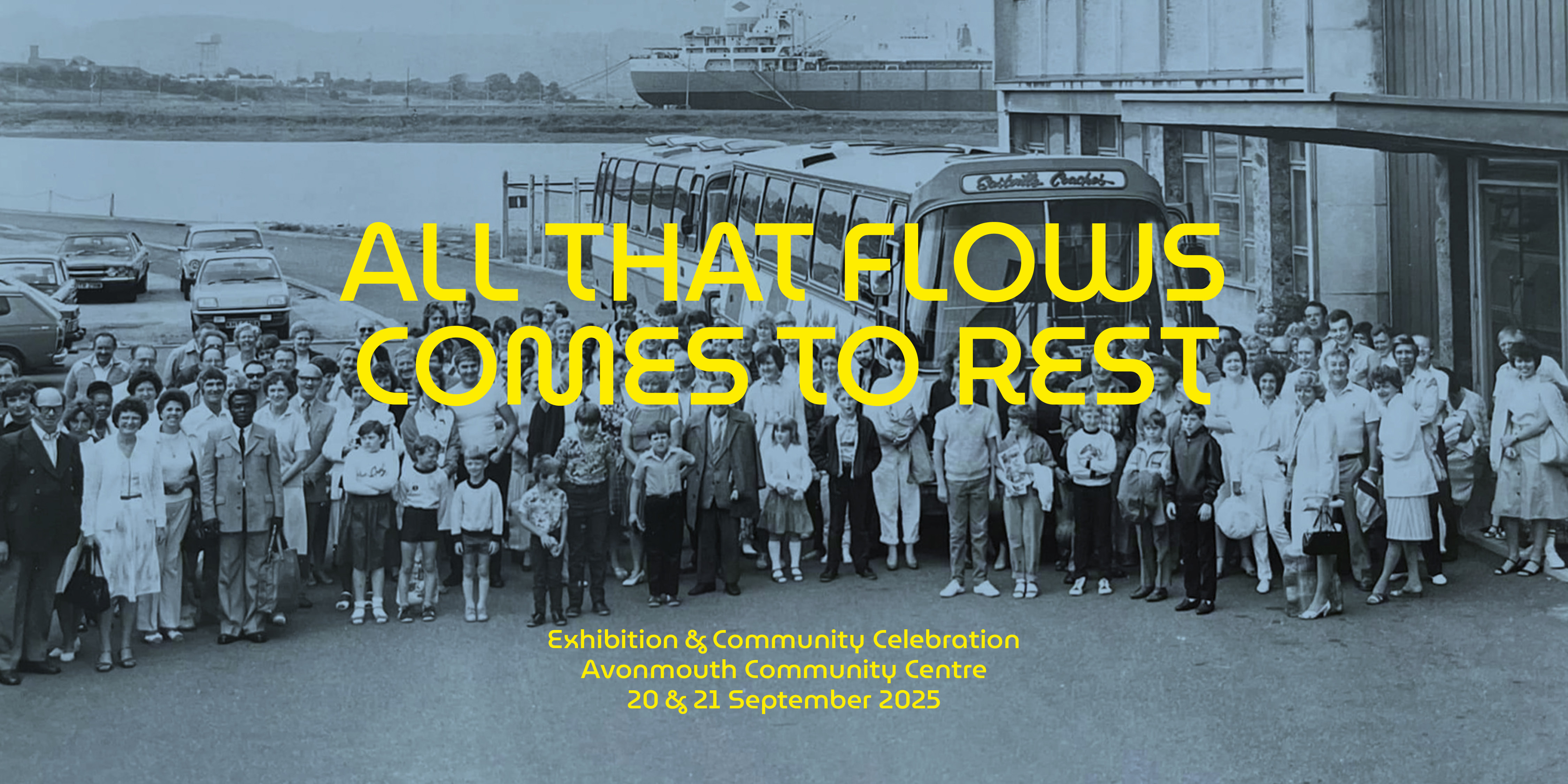
ALL THAT FLOWS COMES TO REST
Celebration event
20 - 21 September, 2025
Avonmouth Community Centre
257 Avonmouth Rd, Avonmouth, Bristol BS11 9EN
Opening hours: Sat 4-8pm | Sun 2-5pm
MORE INFO & BOOK YOUR PLACE
Join us to celebrate All That Flows Comes to Rest - a community project exploring the past, present and future of Avonmouth. In collaboration with local residents, the project set out to gather stories and images of Avonmouth; from the early development of the port to the experience of those living locally today. So far we have compiled over 4000 images, alongside postcards and other ephemera, all of which will be entered into a new community archive, to be held at Avonmouth Community Centre and Library. A selection of the gathered materials will be presented as an exhibition across the main hall of Avonmouth Community Centre. Alongside this exhibition, we will screen three new films, created as part of the project.
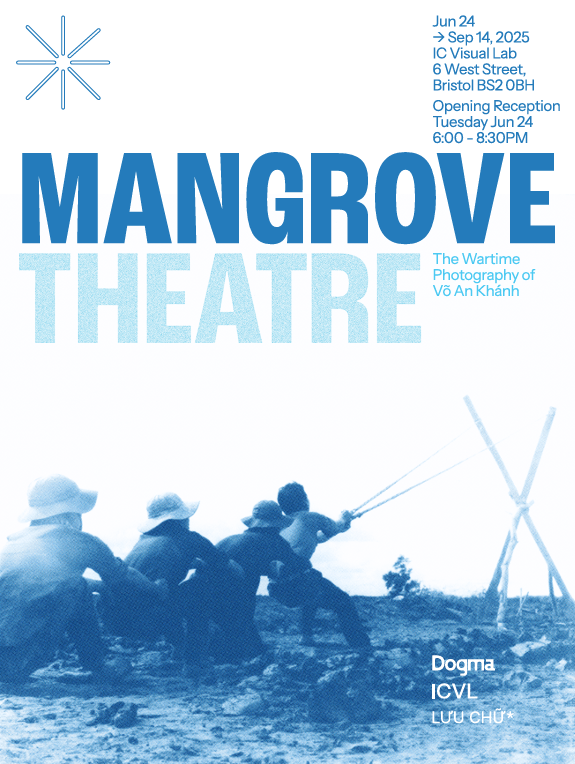

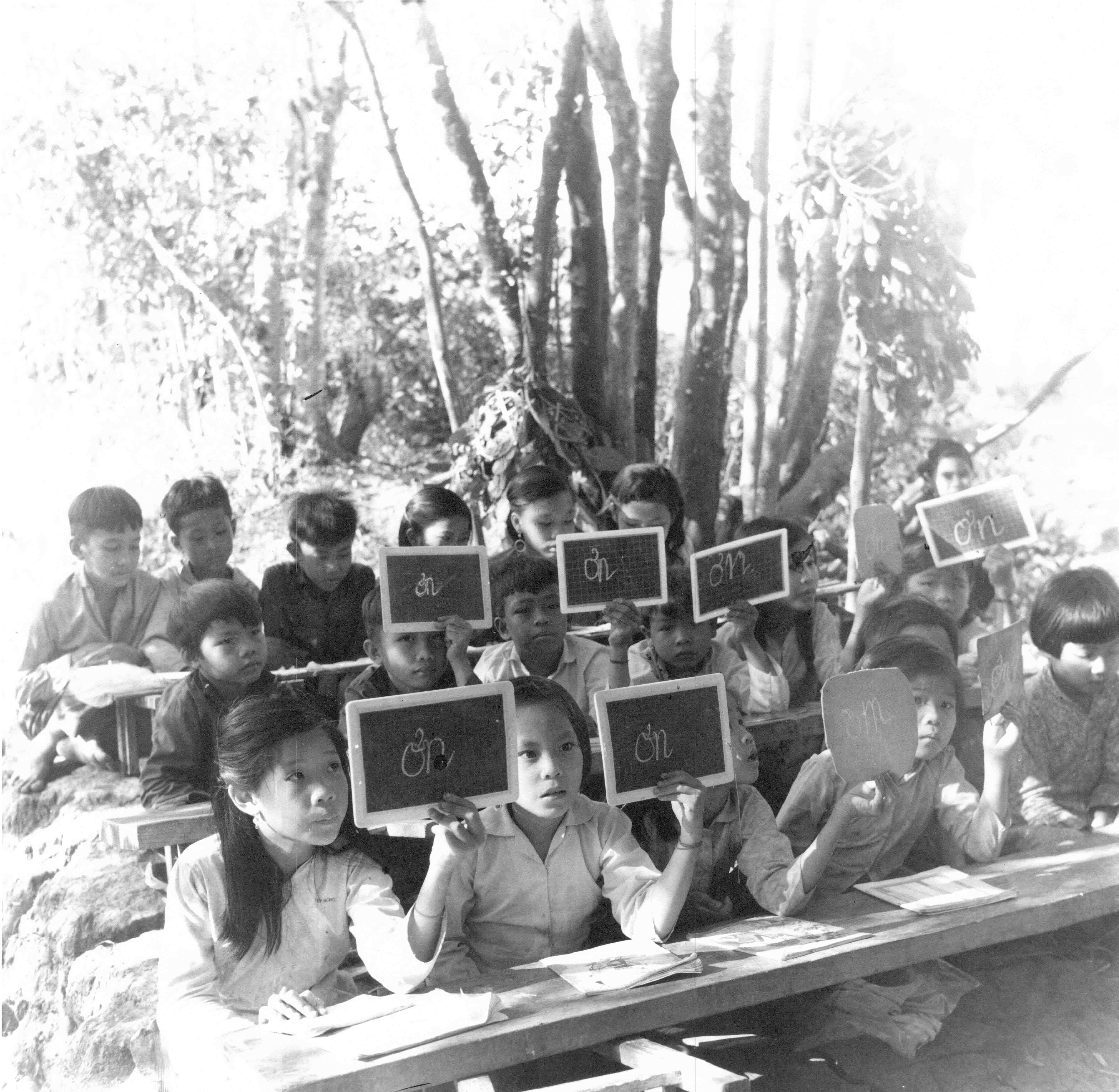
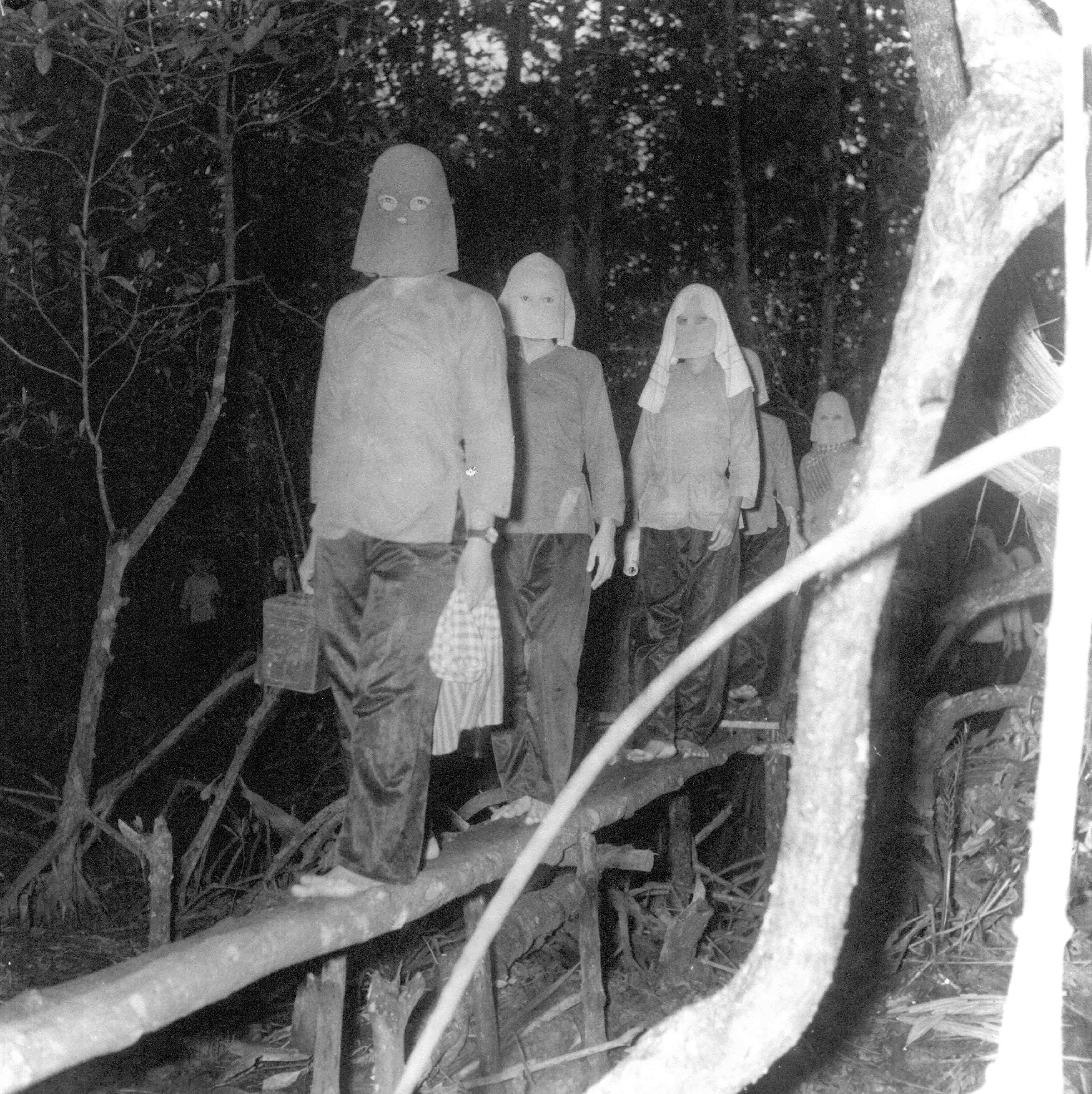
MANGROVE THEATRE
The Wartime Photography of Võ An Khánh
24 June - 14 September, 2025
IC Visual Lab / 6 West St, Bristol, BS2 0BH
Opening Reception: Tue 24th June - 6-8.30pm
Opening hours: Thu-Sat, 12-5pm
Exhibition Press Release
Throughout the Vietnam War, Võ An Khánh (1936-2023) documented the hidden lives of communist guerrilla fighters and their communities, living throughout the country's mangrove forests. A member of the North Vietnam Communist Army, Võ was tasked with upholding the vision of collective socialist struggle, yet his images often dwell on unexpected moments of relative stillness. Women can be seen performing balletic leads across flooded fields, while children study in makeshift forest classrooms. Elsewhere medics operate standing knee-deep in swamp water - a scene of wartime surrealism that Hollywood studios would spend fortunes attempting to recreate.
For decades, Western photographers shaped how the world saw the Vietnam War through images of pain and bloodshed. While these photographs stirred emotions worldwide, they reduced Vietnam to a narrow stereotype. Võ’s images stand as a testament to the complexity of life, even in the midst of war. ‘Mangrove Theatre’ is the first solo exhibition of Võ’s work to be staged in Europe.
The exhibition is accompanied by the symposium ‘Uncatalogued: Vietnam and Archives of Visual Culture’ (27-29th June, 2025), staged across London at MayDay Rooms, Dalston CLR James Library and Hackney Archives. Ticket details will be released shortly.
The exhibition is produced in collaboration with Dogma Collection (HCMC, Vietnam).
To accompany the exhibition, we have translated an interview with Võ An Khánh, conducted in 2013 by writer and scholar Thy Phu (University of Toronto). This is the first time this rare interview has been available to audiences in English.

NEW NARRATIVES / WHIPLASH MEMORIAL
by Max Ferguson
Friday, 4 April 2025
IC Visual Lab / 6 West Street BS2 0BH
Opening Night: Friday 4th April - 6.30-8.30pm - all welcome
Exhibition continues - Thu-Sat, 12-5pm, until 11th May
Artist Talk with Max Ferguson
Saturday 5 April 2025 4.30pm
BOOK TICKETS
Max Ferguson's Whiplash Memorial is a poetic reflection on the shifting histories of North Kensington, exploring the intersection of memory, architecture and belonging. At the core of the project lies the Westway flyover - a towering, brutalist structure that has long fascinated Ferguson. This raised section of the A40 cuts through the heart of North Kensington, passing his childhood home on one side and the shadow of Grenfell Tower on the other. The project is a cryptic love letter to a flyover and the community beneath it, weaving together personal and collective histories.
Max Ferguson is the inaugural recipient of the New Narratives Award, organised by IC Visual Lab in collaboration with UWE Bristol. Artist Talk Join us on Saturday 5th April (4-6pm) for an in-conversation event where Max will be unpacking the themes of the exhibition alongside the team at IC Visual Lab. The conversation will draw upon ideas of place, architecture and belonging, while also considering Max's expansive approach to visual storytelling. Tickets are £4 and likely to go quick, so do grab one if you want to attend.
Max Ferguson is the inaugural recipient of the New Narratives Award, organised by IC Visual Lab in collaboration with UWE Bristol. Artist Talk Join us on Saturday 5th April (4-6pm) for an in-conversation event where Max will be unpacking the themes of the exhibition alongside the team at IC Visual Lab. The conversation will draw upon ideas of place, architecture and belonging, while also considering Max's expansive approach to visual storytelling. Tickets are £4 and likely to go quick, so do grab one if you want to attend.
Artist Workshop
On Saturday 3rd May 10am - 5pm
BOOK TICKETS
Max will be leading a one-day workshop exploring forms of storytelling in relation to specific places and communities. The workshop will use the context of Bristol and the M32 motorway as a starting point, looking at the how the construction of the road echoes closely with his own study of the Westway flyover in London. The workshop will explore the entanglement of the personal and political, as well as the role of the diary and the archive, asking how we can tell deeper, more complex stories about the places we inhabit.
This workshop is open to all. You don't have to be a photographer, you just have to be interested in ways of telling stories. The workshop will be practical, including moving around the neighbourhood, making images and gathering materials.
This workshop is open to all. You don't have to be a photographer, you just have to be interested in ways of telling stories. The workshop will be practical, including moving around the neighbourhood, making images and gathering materials.
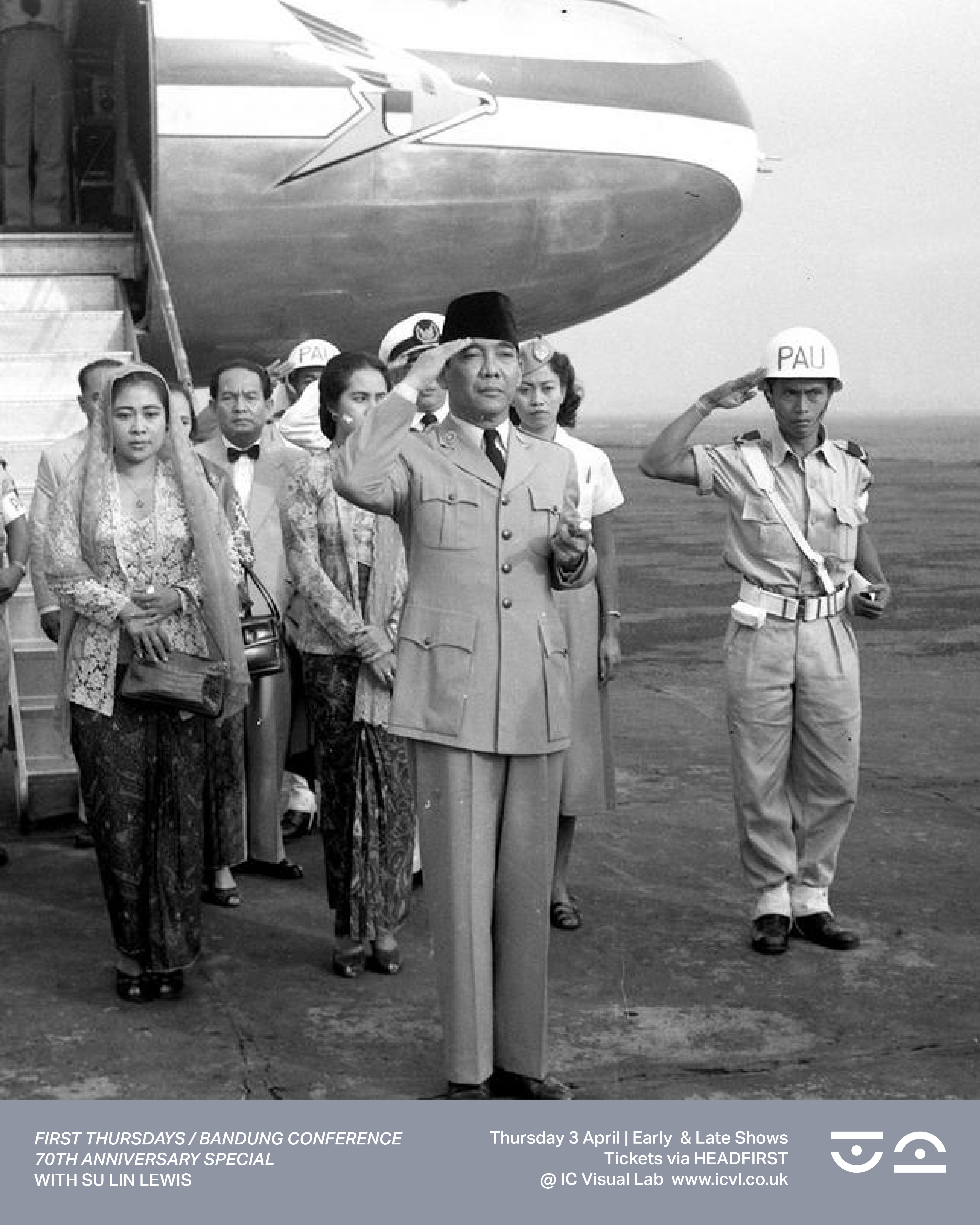
FIRST THURSDAY - BANDUNG ANNIVERSARY SPECIAL
Thursday 3rd April 2025
Early Session 6pm (SOLD OUT)
Late session 8pm
BOOK TICKETS
The Bandung Conference (Indonesia, April 18th-24th, 1955) assembled representatives from 29 Asian and African nations, most of whom were newly independent. Together they discussed how to work together for a more equal world, all in the aftermath of European colonialism. The conference laid the foundations for the nonaligned movement, thus becoming a symbol of peace and international cooperation throughout the cold war period.
Join us for an evening of discussion and sounds to mark the 70th anniversary of the conference. The evening will be led by Professor Su Lin Lewis (Global & Asian History, University of Bristol) who will be telling the story of Bandung and the many movements that grew from this moment. Alongside the conversation we will be playing a selection of archival sounds and songs from the time of the conference. From the music career of Cambodia’s political leader Norodom Sihanouk, to songs written to celebrate independence in Ghana, to the sounds of 1950s Indonesian pop. Expect a heady mix of folk, highlife, soukous, early psychedelia and more.
This event is the fifth in our ‘First Thursdays’ series. Each event invites a guest to present a collection of music, alongside photography and film. The series focuses upon hidden collections, field recordings, ethnographic sounds and accidental archives, considering what they tell us about today’s entangled world.
Join us for an evening of discussion and sounds to mark the 70th anniversary of the conference. The evening will be led by Professor Su Lin Lewis (Global & Asian History, University of Bristol) who will be telling the story of Bandung and the many movements that grew from this moment. Alongside the conversation we will be playing a selection of archival sounds and songs from the time of the conference. From the music career of Cambodia’s political leader Norodom Sihanouk, to songs written to celebrate independence in Ghana, to the sounds of 1950s Indonesian pop. Expect a heady mix of folk, highlife, soukous, early psychedelia and more.
This event is the fifth in our ‘First Thursdays’ series. Each event invites a guest to present a collection of music, alongside photography and film. The series focuses upon hidden collections, field recordings, ethnographic sounds and accidental archives, considering what they tell us about today’s entangled world.

SOUNDS OF CONNEMARA
with Tom Connolly (Fohn)
Thursday, 6 March 2025
IC Visual Lab / 6 West Street BS2 0BH
BOOK TICKETS
Tom Connolly, is a musician best known for his work with the celebrated Bristol quartet Quade. In 2024, he released his first solo record under the moniker ‘Fohn’. The album, ‘Seanteach’, explores displacement, lore and belonging in relation to the West of Ireland. Tom draws attachment via his Dad's family, who were from Connemara yet forced like many others to migrate to Boston. Using the fiddle as his primary tool of composition, his music shifts between traditional folk, field recordings, ambient electronics and experimental sound collage.
Join us for an evening of music and discussion. Tom will be playing a selection of songs and field recordings from the West of Ireland, while discussing the history of the region and its diaspora. We will unpack themes of power, authenticity, displacement and tradition, ultimately asking how the region’s cultural history might lead us to unexpected futures.
This event is the fourth of our ‘Thursdays’ series. Each event invites a guest to present a collection of music, alongside photography and film. The series focuses upon hidden collections, field recordings, ethnographic sounds and accidental archives, considering what they tell us about today’s entangled world.
Join us for an evening of music and discussion. Tom will be playing a selection of songs and field recordings from the West of Ireland, while discussing the history of the region and its diaspora. We will unpack themes of power, authenticity, displacement and tradition, ultimately asking how the region’s cultural history might lead us to unexpected futures.
This event is the fourth of our ‘Thursdays’ series. Each event invites a guest to present a collection of music, alongside photography and film. The series focuses upon hidden collections, field recordings, ethnographic sounds and accidental archives, considering what they tell us about today’s entangled world.
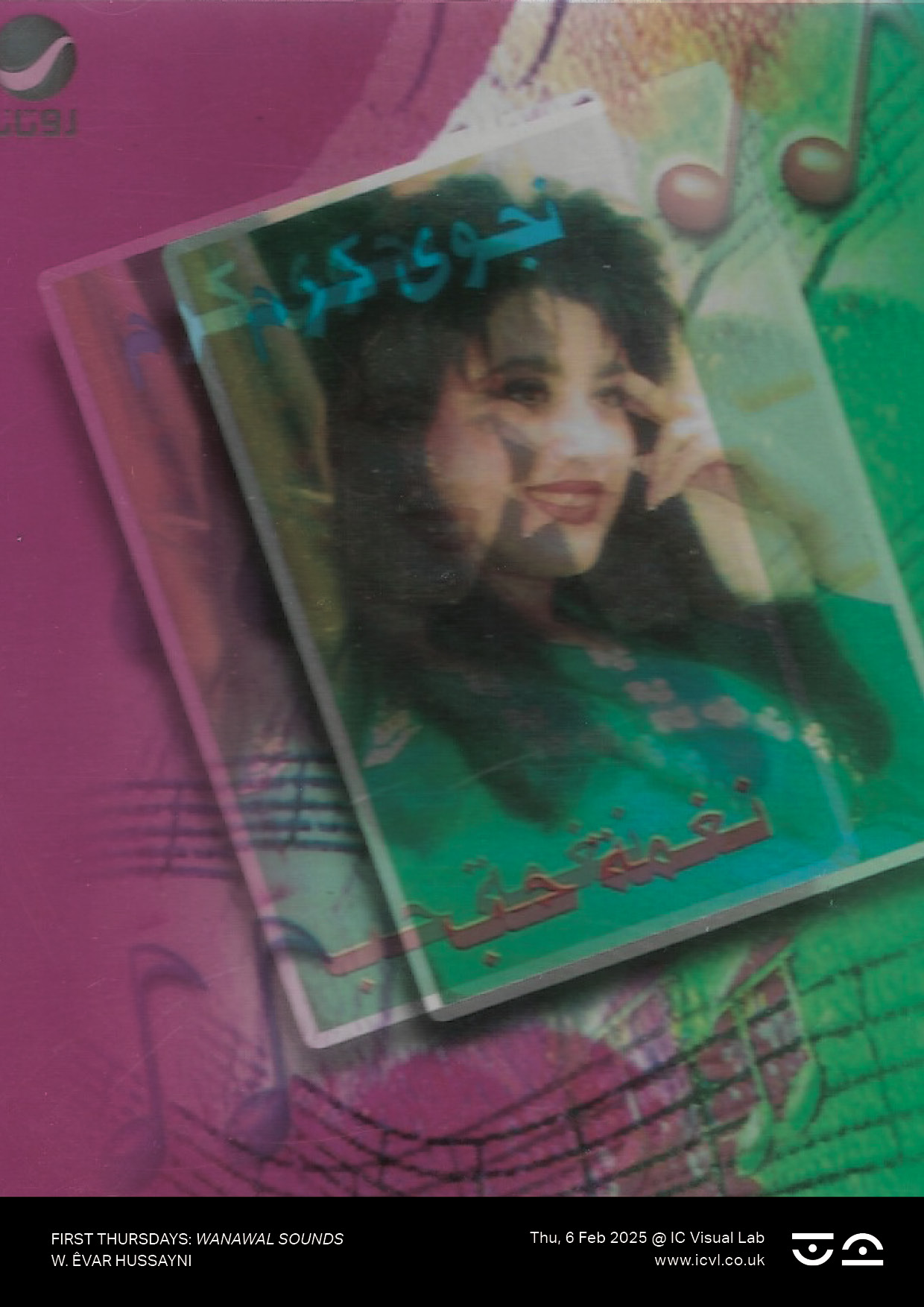
WANAWAL SOUNDS
with Êvar Hussayni
Thursday, 6 Feb 2025
IC Visual Lab / 6 West Street BS2 0BH
BOOK TICKETS
The West Asian and North African Women’s Art Library (WANAWAL) is an alternative archive and library that exists to catalogue, preserve and share creative practices from West Asian and North African practitioners. Founded in 2019 by Êvar Hussayni, the project challenges the colonial methods and histories that lie at the heart of many archives, instead favouring experimental and collective methods that embrace slowness and dialogue at all times. Ultimately WANAWAL aims to create an open and accessible library that builds towards a more liberated collective memory.
Aside from leading WANAWAL, Êvar is a multi-disciplinary artist focused on Kurdish genealogies, feminisms and identity. Her work investigates the colonial violence of archives, which often erase communities that do not conform to a dominant reading of history. She is interested in the psychological aspect of the archive, as well as the role that memory-making plays in shaping freedom - specifically for occupied people and lands.
We are honored to be joined by Êvar for an evening exploring WANAWAL’s sound archive. Expect Kurdish, Armenian, Assyrian and Cypriot field recordings, interviews, resistance music and chants, alongside conversations and visual projections.
This event is part of the City Centre and High Streets Culture and Events Programme, funded by Bristol City Council and the West of England Combined Authority. All events are free - the ticket fee of £6 can be refunded to all who attend, or exchanged for refreshments.
Aside from leading WANAWAL, Êvar is a multi-disciplinary artist focused on Kurdish genealogies, feminisms and identity. Her work investigates the colonial violence of archives, which often erase communities that do not conform to a dominant reading of history. She is interested in the psychological aspect of the archive, as well as the role that memory-making plays in shaping freedom - specifically for occupied people and lands.
We are honored to be joined by Êvar for an evening exploring WANAWAL’s sound archive. Expect Kurdish, Armenian, Assyrian and Cypriot field recordings, interviews, resistance music and chants, alongside conversations and visual projections.
This event is part of the City Centre and High Streets Culture and Events Programme, funded by Bristol City Council and the West of England Combined Authority. All events are free - the ticket fee of £6 can be refunded to all who attend, or exchanged for refreshments.

SOUNDS FROM OKINAWA
with David Mckeown (aka.zato)
Thursday, 7 November 2024
IC Visual Lab / 6 West Street BS2 0BH
BOOK TICKETS
Originally hailing from Newry in (N.) Ireland, in 2017 David Mckeown moved to Okinawa, Japan, immersing himself in the local music scene. He organised experimental music nights under the name inis:eto, alongside an ongoing mix series that continues to draw together DJs and selectors from across the globe, all set against the backdrop of Okinawa.
Now based in Bristol, he retains strong connections with Japan. By day he is an academic researcher studying the legal frameworks, contested values and spaces of activism that surround Japan’s satoyama landscapes. By night he is a prolific music selector, recently launching the label Bellyache, alongside a monthly show on Noods Radio and regular parties at Strange Brew under the moniker O.S.T.
David’s musical commitments reach beyond dancefloors, incorporating field recordings, ambient sounds, folk music and overlooked oddities. During his years in Okinawa, music and activism often overlapped, with many dance floor friends involved in efforts to resist the expansion of a nearby US Marine Corps base in Henoko. Studying the colonial histories of both Okinawa/Ryukyu and his native Ireland, led to an understanding of the shared importance of sound as a form of cultural resistance across both locations. In the case of Okinawa, this sound has often taken the form of Min'yō folk recordings, which stand as a testament to cultural independence and perseverance.
Through a dialogue with images of protest, folk and club culture, the evening will reflect on the intersection of music and resistance in Okinawa. David will be playing a selection of Min'yō folk recordings, unpacking their ongoing significance today. Alongside the music, we will be screening Tomatsu Shomei’s seminal photobook Camp Okinawa. Photographed over a 40-year period (1960-2008), it offers a unique portrait of the island, examining the culture born from the American military presence, as well Okinawa’s relative isolation from the rest of Japan.
Now based in Bristol, he retains strong connections with Japan. By day he is an academic researcher studying the legal frameworks, contested values and spaces of activism that surround Japan’s satoyama landscapes. By night he is a prolific music selector, recently launching the label Bellyache, alongside a monthly show on Noods Radio and regular parties at Strange Brew under the moniker O.S.T.
David’s musical commitments reach beyond dancefloors, incorporating field recordings, ambient sounds, folk music and overlooked oddities. During his years in Okinawa, music and activism often overlapped, with many dance floor friends involved in efforts to resist the expansion of a nearby US Marine Corps base in Henoko. Studying the colonial histories of both Okinawa/Ryukyu and his native Ireland, led to an understanding of the shared importance of sound as a form of cultural resistance across both locations. In the case of Okinawa, this sound has often taken the form of Min'yō folk recordings, which stand as a testament to cultural independence and perseverance.
Through a dialogue with images of protest, folk and club culture, the evening will reflect on the intersection of music and resistance in Okinawa. David will be playing a selection of Min'yō folk recordings, unpacking their ongoing significance today. Alongside the music, we will be screening Tomatsu Shomei’s seminal photobook Camp Okinawa. Photographed over a 40-year period (1960-2008), it offers a unique portrait of the island, examining the culture born from the American military presence, as well Okinawa’s relative isolation from the rest of Japan.

The Majazz Project: Palestinian Sound Archive
Thursday, 7 November
IC Visual Lab / 6 West Street BS2 0BH
Late Show from 8:30 - 10 PM
Through years of digging, discovering and remastering, artist Mo'min Swaitat has created The Majazz Project, an archive of Palestinian sound and music. An act of reclamation and a site of resistance to colonial erasure, the archive is an embodiment of Palestinian culture across decades. Weaving tales of joy, grief, love, resistance, and steadfastness, these sounds are bridging generations. These sonic stories have travelled a long way to you, beckoning, a hand held out through time itself.
In collaboration with Bristol Photo Festival, Mo'min will be presenting the archive - playing records and discussing their significance. Join us for an informal evening of sound and discussion.
In collaboration with Bristol Photo Festival, Mo'min will be presenting the archive - playing records and discussing their significance. Join us for an informal evening of sound and discussion.
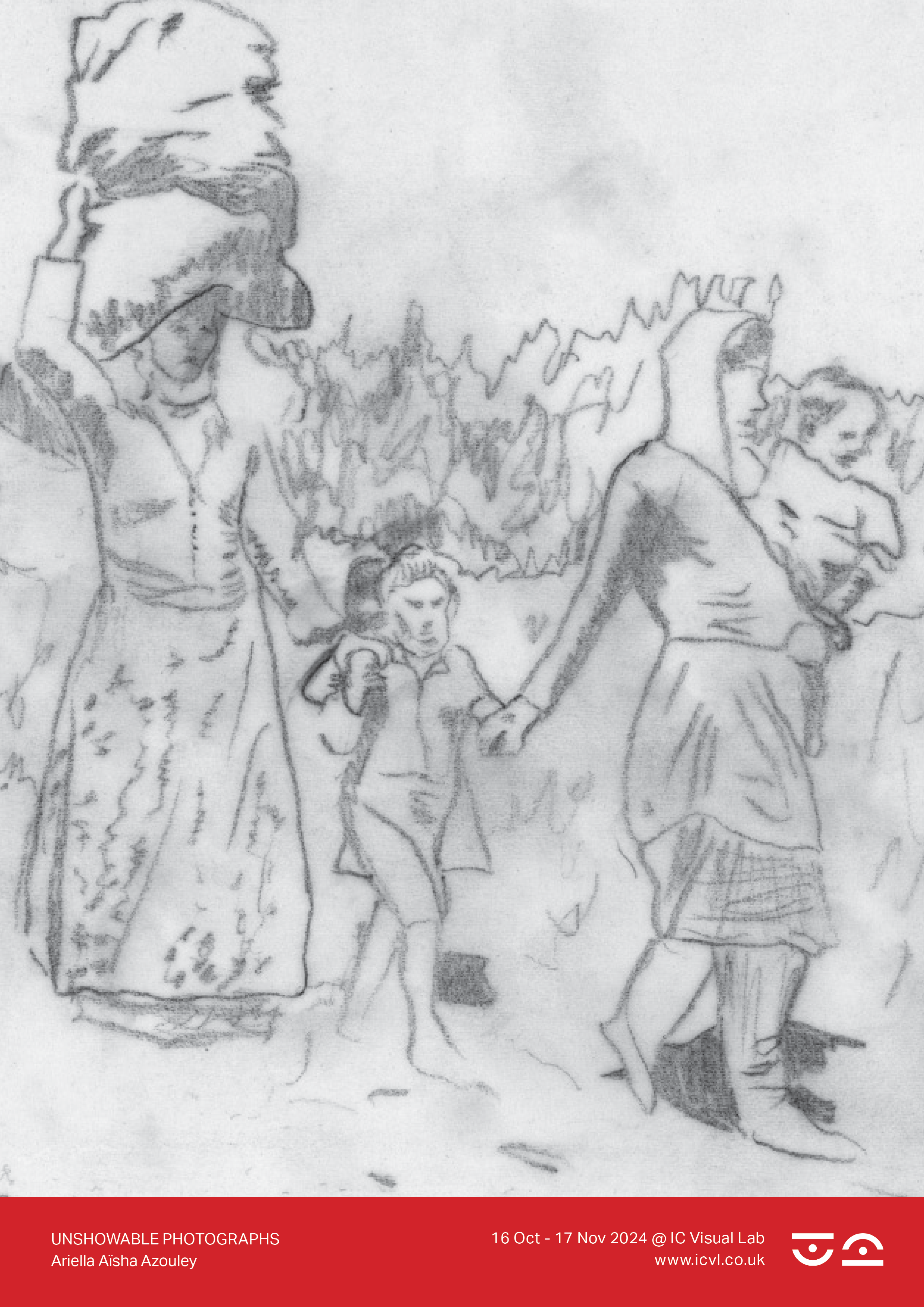
UNSHOWABLE PHOTOGRAPHS
16 Oct to 17 Nov 2024
IC Visual Lab / 6 West Street BS2 0BH
Thu-Sun 11am-5pm
In 2009, Ariella Aïsha Azoulay visited the International Committee of the Red Cross headquarters in Geneva, Switzerland, to view archival photographs of Palestine, taken between 1947 and 1950. The images document the forced displacement of the Palestinian population – an event commonly known as the ‘Nakba’. Azoulay was instructed that the archival images could not be reproduced or exhibited unless strict conditions were met, limiting the free interpretation of the material and ultimately of history itself. In response, Azoulay decided to draw the photographs, creating a record that exists beyond the control of official narratives and archives.
About Ariella Aïsha Azoulay
Ariella Aïsha Azoulay holds a dual appointment in the Department of Modern Culture and Media and the Department of Comparative Literature at Brown University. She is a film essayist and independent curator of archives and exhibitions. Her research and recent book, Potential History (Verso, 2019), concern key political concepts/institutions: archive, sovereignty, plunder, art, human rights, return and repair. Potential history, a concept and an approach she has developed over the last decade, has far-reaching implications for the fields of political theory, archival formations, and photography studies as well as for the reversal of imperial violence.
Azoulay studied at the Université Paris VIII and received her DEA from the École des hautes études en sciences sociales and PhD from Tel Aviv University’s Cohn Institute. Her books include Civil Imagination: The Political Ontology of Photography (Verso, 2012), From Palestine to Israel: A Photographic Record of Destruction and State Formation, 1947-1950 (Pluto Press, 2011), The Civil Contract of Photography (Zone Books, 2008), and (with Adi Ophir) The One State Condition: Occupation and Democracy between the Sea and the River (Stanford, 2012). Among her films are Un-Documented: Unlearning Imperial Plunder (2019) and Civil Alliances, Palestine, 47-48 (2012). Her exhibitions include Errata (Tapiès Foundation, 2019; HKW, Berlin, 2020), Enough! The Natural Violence of New World Order (F/Stop photography festival, Leipzig, 2016), and Act of State 1967-2007, (Centre Pompidou, 2016; Arquivo Municipal de Lisboa Fotográfico, 2020).
About Ariella Aïsha Azoulay
Ariella Aïsha Azoulay holds a dual appointment in the Department of Modern Culture and Media and the Department of Comparative Literature at Brown University. She is a film essayist and independent curator of archives and exhibitions. Her research and recent book, Potential History (Verso, 2019), concern key political concepts/institutions: archive, sovereignty, plunder, art, human rights, return and repair. Potential history, a concept and an approach she has developed over the last decade, has far-reaching implications for the fields of political theory, archival formations, and photography studies as well as for the reversal of imperial violence.
Azoulay studied at the Université Paris VIII and received her DEA from the École des hautes études en sciences sociales and PhD from Tel Aviv University’s Cohn Institute. Her books include Civil Imagination: The Political Ontology of Photography (Verso, 2012), From Palestine to Israel: A Photographic Record of Destruction and State Formation, 1947-1950 (Pluto Press, 2011), The Civil Contract of Photography (Zone Books, 2008), and (with Adi Ophir) The One State Condition: Occupation and Democracy between the Sea and the River (Stanford, 2012). Among her films are Un-Documented: Unlearning Imperial Plunder (2019) and Civil Alliances, Palestine, 47-48 (2012). Her exhibitions include Errata (Tapiès Foundation, 2019; HKW, Berlin, 2020), Enough! The Natural Violence of New World Order (F/Stop photography festival, Leipzig, 2016), and Act of State 1967-2007, (Centre Pompidou, 2016; Arquivo Municipal de Lisboa Fotográfico, 2020).
In collaboration with:

